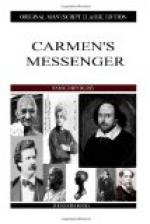Leaving the tea-room, he walked for a short distance and then stopped on the pavement in Princes Street and looked about. It was dark, but a biting wind had cleared the air. At one end of the imposing street a confused glimmer marked the neighborhood of the Caledonian station, and when one looked the other way a long row of lights ran on, and then curving round and rising sharply, ended in a cluster of twinkling points high against the sky. The dark, blurred mass they gathered round was the Castle rock, and below it the tall spire of the Scott monument was faintly etched against the shadowy hollow where the gardens sloped away.
Now he had resolved to leave the city, Foster felt its charm and half resented being, in a manner, forced to go, but walked on, musing on the way women had recently meddled with his affairs. To begin with, Carmen had given him the troublesome packet, then it was largely for Alice Featherstone’s sake he had embarked on a fresh adventure, and now the girl in the tea-room had warned him to leave the town. It was a privilege to help Alice, but the others’ interference was, so to speak, superfluous. A man could devote himself to pleasing one woman, but one was enough.
After a few minutes he stopped and looked into a shop window as a man passed a neighboring lamp. It was Daly and the fellow moved slowly, although Foster did not think he had seen him yet. He would know very soon and for a moment or two he felt his heart beat, but when he looked round Daly had passed. Foster followed and saw him enter the tea-room. This was disturbing, although Foster remembered that he had told nobody he was going there. He decided to leave Edinburgh as soon as he could next morning and bought a map of southern Scotland on his way back to the hotel.
After dinner, he sat down in the smoking-room near a man to whom he had once or twice spoken. The latter was a red-faced, keen-eyed old fellow, and looked like a small country laird.
“I’ve come over to see Scotland and have been long enough in the capital,” he said. “After all, you can’t judge a country by its towns. What would you advise?”
“It depends upon what ye want to see?” the man replied.
“I think I’d like the moors and hills. I get enough of industrial activity in Ontario, and would sooner hear the grouse and the black-cock than shipyard hammers. Then I’d prefer to take my time and go on foot.”
His companion nodded approval. “Ye have sense. Are ye a good walker?”
“I have walked three hundred miles through pretty rough country and dragged my belongings on a hand-sledge.”
“Then I think I can tell ye how to see rugged Scotland, for the country has two different sides. Ye can take your choice, but ye cannot see both at once. I could send ye by main roads, where the tourists’ motors run, to the show-places, where ye would stay at smart hotels, with Swiss and London waiters, and learn as much o’ Scottish character as ye would in Lucerne or the Strand.”




